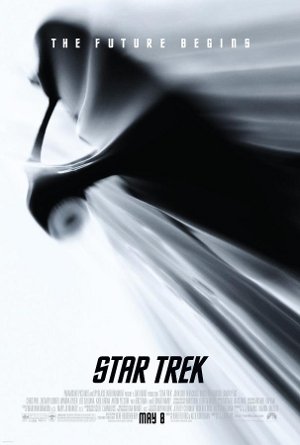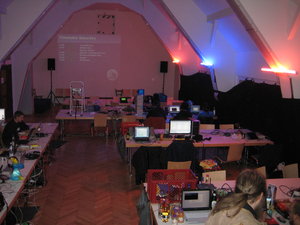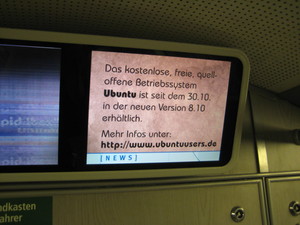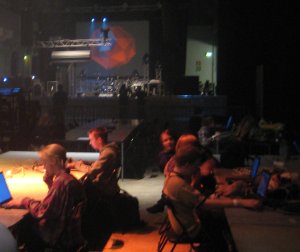Thursday, June 11. 2009
Looking for router firmware alternatives
A couple of projects exist for alternative router firmwares. I used to work with Buffalo Routers combined with DD-WRT.
Now DD-WRT became quite unusable for two reasons. First there was a Cross Site Request Forgery reported on bugtraq a while back, where one of the DD-WRT developers answered in a way that clearly showed he doesn't really understand what CSRF is - so already from a security point of view, DD-WRT seems to be a no-go.
Beside, DD-WRT development more or less is stale at the moment - there are commercial spin-offs and there's been some controversy if everything they did was compliant to the GPL. Fact is there were no new releases since several months - with open security bugs.
Now I've been looking for alternatives. What I'm looking for should be
For now, Gargoyle the only one suitable. It doesn't officially support my Hardware, but it works anyway. I haven't looked deeper into it (e. g. didn't do any security analysis myself), but it seems to do the basic tasks. If you have suggestions of other projects, please leave a comment.
Now DD-WRT became quite unusable for two reasons. First there was a Cross Site Request Forgery reported on bugtraq a while back, where one of the DD-WRT developers answered in a way that clearly showed he doesn't really understand what CSRF is - so already from a security point of view, DD-WRT seems to be a no-go.
Beside, DD-WRT development more or less is stale at the moment - there are commercial spin-offs and there's been some controversy if everything they did was compliant to the GPL. Fact is there were no new releases since several months - with open security bugs.
Now I've been looking for alternatives. What I'm looking for should be
- a ready-to-use router firmware with easy web-interface configuration from the start, not something like OpenWRT
- free software
- obviously, a project that handles security-reports in a sane way
For now, Gargoyle the only one suitable. It doesn't officially support my Hardware, but it works anyway. I haven't looked deeper into it (e. g. didn't do any security analysis myself), but it seems to do the basic tasks. If you have suggestions of other projects, please leave a comment.
Tuesday, June 2. 2009
The return of guybrush threepwood
 This news sounds sensational for all fans of old adventure video games: A new episode of Monkey Island is planned. Ron Gilbert blogged about it a few days ago.
This news sounds sensational for all fans of old adventure video games: A new episode of Monkey Island is planned. Ron Gilbert blogged about it a few days ago.For those who don't know, a very short history of the game series. The first two Monkey Island games were already classics when I played them the first time. In super-pixel graphics, but with an ingenious humor. Already with the third part, many fans were sceptical. Graphics got better, but not 3Dish, which was already pretty common at that time. They even made fun of the tendency to bring all games to 3D back then - they had a 3DFX option, but clicking on that only gave you some sarcastic comment. At least I can say that I found Monkey Island 3 (The Curse of Monkey Island) a deserved successor of the series.
With Monkey Island 4 (Escape from Monkey Island), things got much worse - it had 3D graphics (ugly ones in my opinion) and - probably worse - it completely changed the control. All classic adventures were point and click adventures through the famous SCUMM engine (although the control has changed quite a lot over the time). There even was a SCUMM bar in the first game.
Part 4 had some kind of keyboard control. And the controlling was really bad. So this was the first game in the series I didn't play till the end.
I'm excited to see how the new game will be. It will be released in episodes, I don't know if that's a good idea, but we'll see. I haven't found any information about the controls on their webpage.
Maybe it's worth raising a petition for a Linux version? Seems they don't intend to plan one, though it might be a good idea, as probably a lot of Linux users are retro gaming fans as well.
Posted by Hanno Böck
in Computer culture, English, Retro Games
at
10:53
| Comments (3)
| Trackbacks (0)
Saturday, May 23. 2009
Gentoo is dangerous for children
Tobias Scherbaum already blogged this, but only in german, so I'm writing this again for the Planet Gentoo readers.
A german webpage called jugendschutzprogramm.de provides filters for webpages potentially dangerous for children. Now some people noticed that this page considers quite a lot dangerous.
Both gentoo.de and gentoo.org are considered only suitable for people over 14. So if you ever thought about installing Gentoo on the PC of a kid, think again what you might do to that kid.
Beside, my blog is even more dangerous: It's blocked by default.
The page is supported by a couple of companies providing pornographic content. Interesting enough, it's also supported by a big german Newspaper (BILD) that regularly has pornographic images on their frontpage. However, their page is considered harmless.
But what's really frightening is that jugendschutzprogramm.de is part of ICRA, an international system by big content and internet providers. It's even supported by the european union.
Update: Page has XSS, maybe someone wants to play with it?
<form action="http://jugendschutzprogramm.de/webmaster/label-generator.php" method="post">
<input name="URL" value='"><script>alert(1)</script>' type="text">
<input name="submit" type="submit">
</form>
A german webpage called jugendschutzprogramm.de provides filters for webpages potentially dangerous for children. Now some people noticed that this page considers quite a lot dangerous.
Both gentoo.de and gentoo.org are considered only suitable for people over 14. So if you ever thought about installing Gentoo on the PC of a kid, think again what you might do to that kid.
Beside, my blog is even more dangerous: It's blocked by default.
The page is supported by a couple of companies providing pornographic content. Interesting enough, it's also supported by a big german Newspaper (BILD) that regularly has pornographic images on their frontpage. However, their page is considered harmless.
But what's really frightening is that jugendschutzprogramm.de is part of ICRA, an international system by big content and internet providers. It's even supported by the european union.
Update: Page has XSS, maybe someone wants to play with it?
<form action="http://jugendschutzprogramm.de/webmaster/label-generator.php" method="post">
<input name="URL" value='"><script>alert(1)</script>' type="text">
<input name="submit" type="submit">
</form>
Posted by Hanno Böck
in Computer culture, English, Gentoo, Politics
at
12:46
| Comments (4)
| Trackbacks (0)
Saturday, May 9. 2009
Big disappointment Star Trek XI
 Before I start my review about the movie, I'd like to give some preface about my connection to Star Trek. Although I occasionally watched the series for a long time, I really started getting interested at the worst possible moment - shortly after it was announced that the last series »Enterprise« was stopped (although there were petitions and rallies - I just noted a bit too late to take part).
Before I start my review about the movie, I'd like to give some preface about my connection to Star Trek. Although I occasionally watched the series for a long time, I really started getting interested at the worst possible moment - shortly after it was announced that the last series »Enterprise« was stopped (although there were petitions and rallies - I just noted a bit too late to take part).So with the last series stopped and the last film »Nemesis« being a flop, it was quite unlikely that Star Trek would continue at all in any way. So the only thing left was experiencing the vast majority of past series (which I'd suggest everyone to do - my favorite is Deep Space 9).
So the message that there should be a new film was surprising and promising. Though from the beginning, I was quite sceptical - the concept of a prequel to the original series with new actors for famous roles seemed difficult. It rarely happened in the past that different actors played the same person in the Star Trek universe and it was only the case for side roles (e. g. Ziyal in DS9, Zefram Cochrane in TOS/ST8). But what was even more disturbing was the director J. J. Abrams - with movies like Armageddon I didn't find him very predestined for this job. But as I read some quite positive reviews, I gave the movie a chance and went to the cinema on the first day.
To give a conclusion: I was absolutely right not to expect much from the film. It is a middle-class Hollywood action movie and has just nothing from the Star Trek spirit I liked so much.
The no-gos are countless. I mean, product placement is a pity in films any way, but in a Star Trek movie? And have you ever heard a pop song from the 90s in ST? (Oh, you remember that scene from ST4 in the bus? Has the guy inventing that scene with Kirk in the car ever seen that movie?)
The film introduces lot's of characters from other ST stories without any relation. Soval (was the name even mentioned?) has just nothing of the person known from TOS/TNG. Those Romulans - they look different, their ships look different, there's no connection to any previous Romulan story, it just seems like a randomly picked species name. And the old Spock - yeah, every real Trekkie likes to see Leonard Nimoy is still able to play his role. But if you remember the last time Spock appeared in the ST universe - a plot in TNG with an underground resistance movement on Romulus, where Spock stayed - a quite open end - it's just predestined to continue telling that story. ST11 doesn't do that.
Then there's this thing with the parallel time line - parallel time lines are a common story methodology in Star Trek, so the idea has potential. But it seems it's just there so there's no need to stick with the Star Trek story too much - every mistake can just be explained as something happening in the alternative time line. It didn't really make any sense to me beside that.
Well, maybe the buzz around the movie opens perspectives for new Star Trek material in the future - and hopefully with more talented directors behind the scenes. Till then, I'll watch some episodes of Hidden Frontier.
Update: Only german, but nice review (WOZ).
Thursday, May 7. 2009
USB hard drives with SMART
A common way to check the health state of a hard disk is SMART. It gives various informations about occuring errors. In Linux, there's the smartmontools package containing tools to read SMART data of hard drives (smartctl -a /dev/[hddevice] gives you a bunch of information).
I found it always frustrating that SMART didn't work with USB drives. It's a standard bound to IDE/ATA. Although common USB-drives are internally IDE/SATA, sending the SMART commands to the drive requires proprietary extensions. But now, the smartmontools-developers have included support for some USB drives. It worked with the USB HDs I had available for testing.
There's no release yet containing the USB-support. If you're on Gentoo, you can fetch a live-CVS ebuild here.
I found it always frustrating that SMART didn't work with USB drives. It's a standard bound to IDE/ATA. Although common USB-drives are internally IDE/SATA, sending the SMART commands to the drive requires proprietary extensions. But now, the smartmontools-developers have included support for some USB drives. It worked with the USB HDs I had available for testing.
There's no release yet containing the USB-support. If you're on Gentoo, you can fetch a live-CVS ebuild here.
Tuesday, January 13. 2009
Study research project about session cookies, SSL and session hijacking
In the last weeks, I made a study research project at the EISS at the University of Karlsruhe. The subject was »Session Cookies and SSL«, investigating the problems that arise when trying to secure a web application with HTTPS and using session cookies.
I already wrote about this in the past, presenting vulnerabilities in various web applications.
One of the notable results is probably that ebay has just no measurements against those issues at all, so it's pretty trivial to hijack a session (and use that to do bids and even change the address of the hijacked account).
Download »Session Cookies and SSL« (PDF, 317 KB)
I already wrote about this in the past, presenting vulnerabilities in various web applications.
One of the notable results is probably that ebay has just no measurements against those issues at all, so it's pretty trivial to hijack a session (and use that to do bids and even change the address of the hijacked account).
Download »Session Cookies and SSL« (PDF, 317 KB)
Thursday, December 25. 2008
Filling the proprietary gaps: Real Video (RV30/RV40) support in ffmpeg
The free software projects for media playing did a good job in the past on supporting a wide variety of formats. From the common to many very obscure formats, current versions of the free software mediaplayers were usually able to play them. Today it's even common to suggest vlc for Windows users if they can't play unusual media formats.
Though there were a few exceptions, the most notable probably the long-time missing support for many of the Real formats. While these are rarely used today, many archived videos in the Internet still rely on it. For example, many german television stations provide real video files on their webpages.
Recently and without much public notion, ffmpeg first got support for RV40, some weeks later also for RV30. This fills a long time gap in free software support for video formats. ffmpeg is used by all major free software video players (vlc, xine, mplayer), so you should get the support within some time in all of them. For now, it's quite easy to checkout mplayer from subversion and build it on your own.
Want something to try out? Here's a video from Desert Planet in real format.
The only gap I know of a format that really got usage in the wild and that is not yet supported by free software is WMA3.
Though there were a few exceptions, the most notable probably the long-time missing support for many of the Real formats. While these are rarely used today, many archived videos in the Internet still rely on it. For example, many german television stations provide real video files on their webpages.
Recently and without much public notion, ffmpeg first got support for RV40, some weeks later also for RV30. This fills a long time gap in free software support for video formats. ffmpeg is used by all major free software video players (vlc, xine, mplayer), so you should get the support within some time in all of them. For now, it's quite easy to checkout mplayer from subversion and build it on your own.
Want something to try out? Here's a video from Desert Planet in real format.
The only gap I know of a format that really got usage in the wild and that is not yet supported by free software is WMA3.
Posted by Hanno Böck
in Copyright, English, Gentoo, Linux, Movies
at
15:38
| Comments (4)
| Trackbacks (0)
Wednesday, December 17. 2008
Interview on FSFE webpage
Posted by Hanno Böck
in Computer culture, Copyright, English, Gentoo, Linux, Politics
at
17:28
| Comments (0)
| Trackbacks (0)
Friday, December 5. 2008
0a000h has started
 The 0a000h demoparty just started.
The 0a000h demoparty just started.If you don't know what a demoparty is, it's kind of a digital art event about programming stuff that has no meaning beside »looking good«. The 0a000h is a small demoscene party where I'm part of the organizing.
Pictures here.
Saturday, November 1. 2008
Ubuntu advertisement in the tram of Berlin
 Just saw yesterday that there were advertisements for the new Ubuntu 8.10 release (two days ago) in the subway of Berlin.
Just saw yesterday that there were advertisements for the new Ubuntu 8.10 release (two days ago) in the subway of Berlin.Quite cool, they also were advertising for the Ubuntu release party in the C-Base tonight (though I'm no longer in Berlin at the moment).
Friday, October 24. 2008
Arrived on the Alternative Party
 I just arrived on the Alternative Party in Helsinki. The AltParty is a demoscene party in Finland and it's kind of the smaller splitoff from the Assembly. I was on the Assembly some times in the past.
I just arrived on the Alternative Party in Helsinki. The AltParty is a demoscene party in Finland and it's kind of the smaller splitoff from the Assembly. I was on the Assembly some times in the past.By saying small, I must say that the AltParty still has about 1000 visitors.
I haven't visited any demoparties for quite a long time and thought it'd be time again as I'm currently involved in the organization of the 0a000h, which will happen again in december.
More pictures and reports will follow.
Wednesday, October 8. 2008
Raise your voice against data retention and surveillance

In a few days, on 11th October, there will be an international day of action against the growing surveillance.
Starting with 2009, the data retention law will become duty for everyone, also for internet providers (eMail, Dialup). The german constitutional court still has a big complaint running. It's important to set a sign now.
The main demonstration will be in Berlin, 14:00 at the Alexanderplatz.
freedom-not-fear.eu
Posted by Hanno Böck
in Computer culture, English, Politics
at
12:38
| Comments (0)
| Trackbacks (0)
Defined tags for this entry: berlin, dataretention, datenschutz, demonstration, privacy, vorratsdatenspeicherung
Monday, October 6. 2008
Lenovo, Linux and Windows refunding
Recently there were some News that Lenovo does not like Linux any more. This was supported by comments like this at Lenovoblogs (by a Lenovo engineer):
»Again, what’s the incentive for us to start providing all of this intellectual property for free to the Linux community? You may say it drives support for Linux on ThinkPads and people would buy more ThinkPads as a result. I think that’s a dubious assertion at best.«
(the subject was driver support for switchable graphics on modern thinkpads and brings up some common urban legends about linux and driver support)
Sadly, I experienced one more place where Lenovo seems to shift away from a Linux friendly viewpoint: I tried to return the windows license of my new Thinkpad with a pre-made form by Lenovo itself (I got this from someone else by eMail, not from Lenovo directly). In the net, you can find tons of reports that it was easy for people to get money back for their windows licenses by Lenovo.
Though what I got was this:
»Leider können wir Ihrem Wunsch nach Rückerstattung der Kosten für das auf Ihrem Lenovo Produkt vorinstallierte Microsoft-Betriebssystem nicht entsprechen, da das Betriebssystem aus unserer Sicht einen integralen Bestandteil des jeweiligen Lenovo Produkts darstellt.«
(rough translation: We won't refund your windows-license, because we think it's an integral part of the product)
I find it hard to understand why Lenovo makes this shift. When running around on linux conferences in recent months, the number of thinkpads is hughe. While many other vendors shift to a much more free software friendly behaviour (think of AMD/ATI), Lenovo seems to go the different direction. It's especially strange because Lenovo is probably one of the few vendors that has a notable market share in the linux community.
By the way, I welcome any hints how I should continue with the windows refunding. I'd prefer not to capitulate yet (like I did with my last laptop by Samsung), and I assume the law is clearly on my side.
Update: As some of you asked, here is the form by Lenovo, though you'll probably just get the same reply I got.
Probably interesting, here you can find all EULAs from Microsoft. They are quite clear on the subject and say that you MUST return the windows license to the vendor if you don't agree to the EULA.
In the meantime, I wrote several messages about the issue to various people and instutitions. The FSFE is also working on the subject.
»Again, what’s the incentive for us to start providing all of this intellectual property for free to the Linux community? You may say it drives support for Linux on ThinkPads and people would buy more ThinkPads as a result. I think that’s a dubious assertion at best.«
(the subject was driver support for switchable graphics on modern thinkpads and brings up some common urban legends about linux and driver support)
Sadly, I experienced one more place where Lenovo seems to shift away from a Linux friendly viewpoint: I tried to return the windows license of my new Thinkpad with a pre-made form by Lenovo itself (I got this from someone else by eMail, not from Lenovo directly). In the net, you can find tons of reports that it was easy for people to get money back for their windows licenses by Lenovo.
Though what I got was this:
»Leider können wir Ihrem Wunsch nach Rückerstattung der Kosten für das auf Ihrem Lenovo Produkt vorinstallierte Microsoft-Betriebssystem nicht entsprechen, da das Betriebssystem aus unserer Sicht einen integralen Bestandteil des jeweiligen Lenovo Produkts darstellt.«
(rough translation: We won't refund your windows-license, because we think it's an integral part of the product)
I find it hard to understand why Lenovo makes this shift. When running around on linux conferences in recent months, the number of thinkpads is hughe. While many other vendors shift to a much more free software friendly behaviour (think of AMD/ATI), Lenovo seems to go the different direction. It's especially strange because Lenovo is probably one of the few vendors that has a notable market share in the linux community.
By the way, I welcome any hints how I should continue with the windows refunding. I'd prefer not to capitulate yet (like I did with my last laptop by Samsung), and I assume the law is clearly on my side.
Update: As some of you asked, here is the form by Lenovo, though you'll probably just get the same reply I got.
Probably interesting, here you can find all EULAs from Microsoft. They are quite clear on the subject and say that you MUST return the windows license to the vendor if you don't agree to the EULA.
In the meantime, I wrote several messages about the issue to various people and instutitions. The FSFE is also working on the subject.
Thursday, September 25. 2008
SSL Session hijacking
Recently, two publications raised awareness of a problem with ssl secured websites.
If a website is configured to always forward traffic to ssl, one would assume that all traffic is safe and nothing can be sniffed. Though, if one is able to sniff network traffic and also has the ability to forward the victim to a crafted site (which can, e. g., be just sending him some »hey, read this, interesting text« message), he can then force the victim to open a http-connection. If the cookie has not set the secured flag, the attacker can sniff the cookie and take over the session of the user (assuming it's using some kind of cookie-based session, which is pretty standard on today's webapps).
The solution to this is that a webapp should always check if the connection is ssl and set the secured flag accordingly. For PHP, this could be something like this:
I've recently investigated all web applications I'm using myself and reported the issue (Mantis / CVE-2008-3102, Drupal / CVE-2008-3661, Gallery / CVE-2008-3662, Squirrelmail / CVE-2008-3663). I have some more pending I want to investigate further.
I call security researchers to add this issue to their list of common things one has to look after. I find the firefox-extension CookieMonster very useful for this.
The result of my reports was quite mixed. While the gallery team took the issue very serious (and even payed me a bounty for my report, many thanks for that), the drupal team thinks there is no issue and did nothing. The others have not released updates yet, but fixed the issue in their code.
And for a final word, I want to share a mail with you I got after posting the gallery issue to full disclosure:
for fuck's sake dude! half of the planet, military, government, financial sites suffer from this and the best you could come up with is a fucking photo album no one uses! do everybody a favor and die you lame fuck!
If a website is configured to always forward traffic to ssl, one would assume that all traffic is safe and nothing can be sniffed. Though, if one is able to sniff network traffic and also has the ability to forward the victim to a crafted site (which can, e. g., be just sending him some »hey, read this, interesting text« message), he can then force the victim to open a http-connection. If the cookie has not set the secured flag, the attacker can sniff the cookie and take over the session of the user (assuming it's using some kind of cookie-based session, which is pretty standard on today's webapps).
The solution to this is that a webapp should always check if the connection is ssl and set the secured flag accordingly. For PHP, this could be something like this:
if ($_SERVER['HTTPS']) session_set_cookie_params( 0, '/', '', true, true );
I've recently investigated all web applications I'm using myself and reported the issue (Mantis / CVE-2008-3102, Drupal / CVE-2008-3661, Gallery / CVE-2008-3662, Squirrelmail / CVE-2008-3663). I have some more pending I want to investigate further.
I call security researchers to add this issue to their list of common things one has to look after. I find the firefox-extension CookieMonster very useful for this.
The result of my reports was quite mixed. While the gallery team took the issue very serious (and even payed me a bounty for my report, many thanks for that), the drupal team thinks there is no issue and did nothing. The others have not released updates yet, but fixed the issue in their code.
And for a final word, I want to share a mail with you I got after posting the gallery issue to full disclosure:
for fuck's sake dude! half of the planet, military, government, financial sites suffer from this and the best you could come up with is a fucking photo album no one uses! do everybody a favor and die you lame fuck!
Saturday, September 20. 2008
Free software, proprietary maps?
If you didn't know it, today is Software Freedom Day.
Just noticed that, when you surf to http://cgi.softwarefreedomday.org/map.shtml to look if there's something happening around you on SFD, you'll get a proprietary google map.
It seems that the organizers of the SFD can't look beyond one's own nose. I often saw this behaviour in parts of the free software movement (being ignorant about proprietary stuff if it's not software), but found this example especially frightening, as we have a well working alternative.
Just noticed that, when you surf to http://cgi.softwarefreedomday.org/map.shtml to look if there's something happening around you on SFD, you'll get a proprietary google map.
It seems that the organizers of the SFD can't look beyond one's own nose. I often saw this behaviour in parts of the free software movement (being ignorant about proprietary stuff if it's not software), but found this example especially frightening, as we have a well working alternative.
« previous page
(Page 10 of 23, totaling 335 entries)
» next page